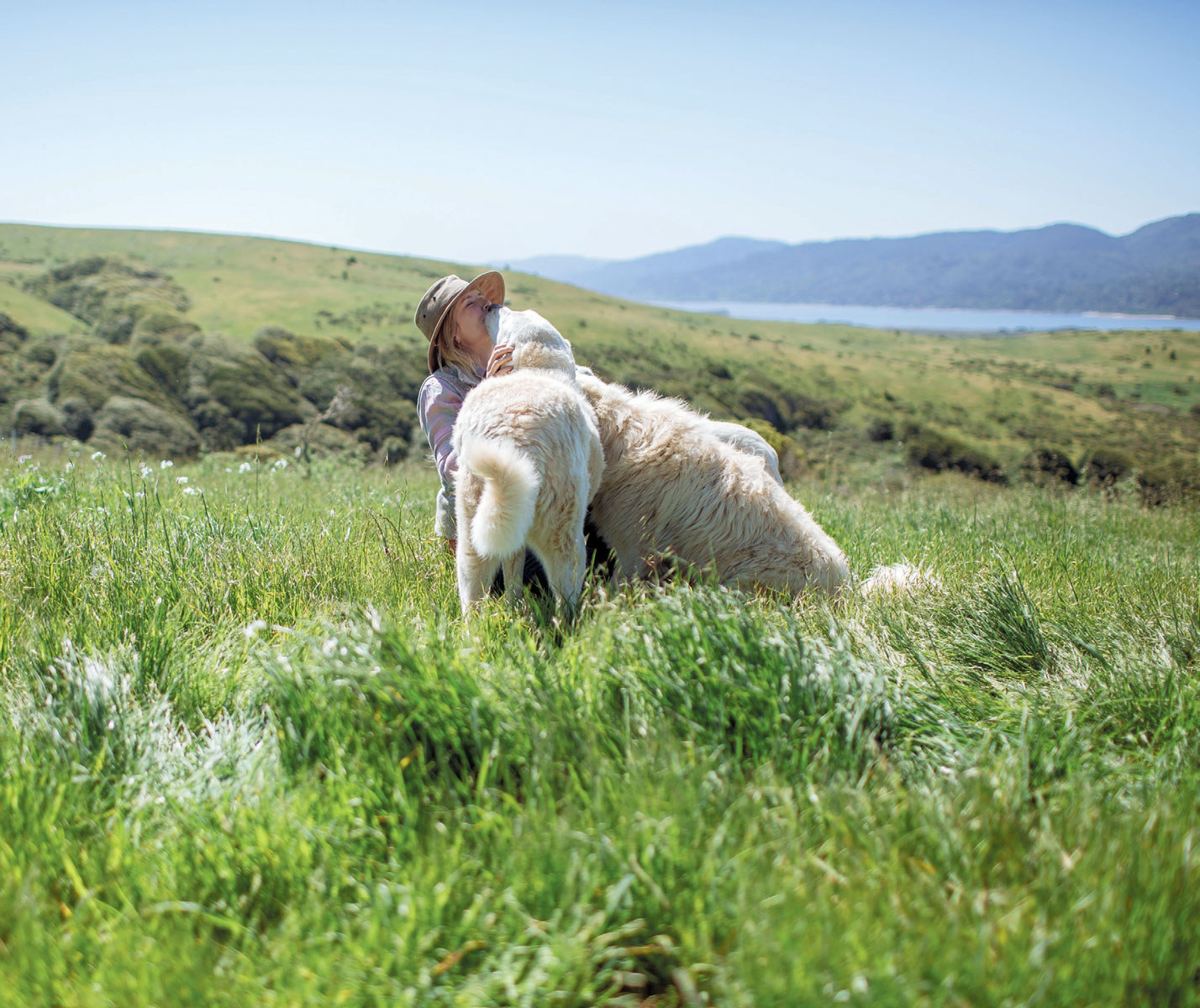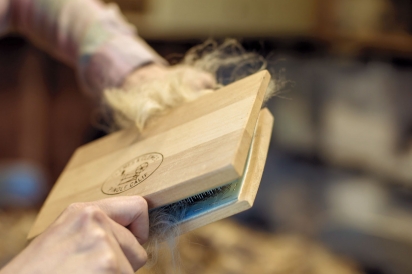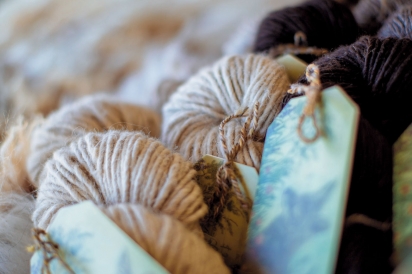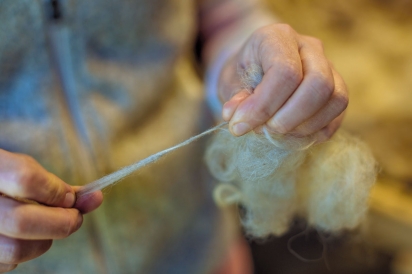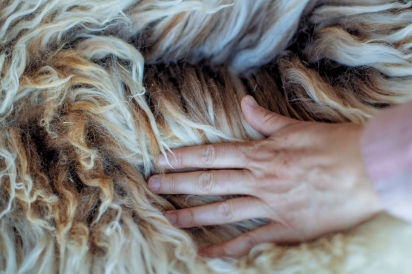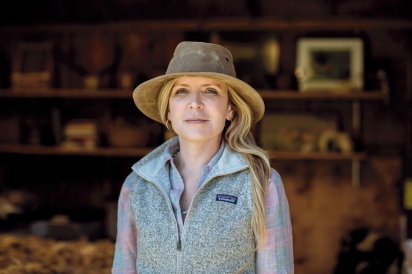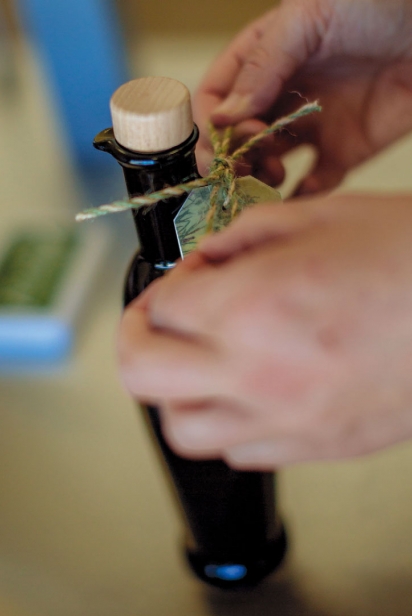A Real Life Green(er) Acres
KELLI DUNAJ CREATES ART OUT OF THE TAPESTRY OF LIFE AT SPRING COYOTE RANCH
Five years ago, Kelli and Ken Dunaj swapped their hard-charging big city lives for a different kind of hard work on Spring Coyote Ranch, a 210-acre olive and sheep ranch overlooking picturesque Tomales Bay in Marshall.
These days, when so many home remodeling shows and upscale furnishings stores—including Kelli and Ken’s former employers—dangle the allure of agrarian life in front of city dwellers, the Dunajs decided to actually live it. Ken, then the COO of Restoration Hardware, and Kelli, who had been the director of distribution for Williams-Sonoma before the couple’s then-5-year-old son was born, traded buttoned-up suits for slouchy flannel shirts, jeans and work boots, and sold their Mill Valley house to live what many of their friends and former colleagues consider a fantasy come true.
Ken, 52, ended up buying and running the only hardware store in Point Reyes Station, while Kelli, 43, now sells ranch-raised provisions at the Point Reyes Farmers’ Market during the summer market season. Yet the couple will be the first to admit that the transition they and their now-11-year-old son Zach made was not nearly as easy as everyone would have dreamed. There were major bumps in the road. There were hard lessons learned. And many mistakes were made along the way.
“This is the first year that I have a sense of confidence. For so long I felt stupid, not knowing what I was doing,” Kelli says. “We made the decision to invest in this life. Did we do the right thing? Absolutely. Do we know what the next five years hold? No. We live with more uncertainty. We are trying to live more in the moment. It sounds clichéd, but we learned a lot and are stronger now.”
Theirs is not so much a case of “be careful of what you wish for” as it is of coming to peace with the vagaries of Mother Nature.
Ken moved to San Francisco from a large farm in Tennessee that raised cover crops, and Kelli grew up in the rural outskirts of Richmond, Virginia, where her family maintained fruit trees and a vegetable garden, but the couple wasn’t necessarily looking to run a farm. They were just looking for an escape valve from the stress of their daily lives, and a different kind of childhood for Zach.
For years before they made the leap, whenever they had time off they would rent a cottage in the Point Reyes area. Eventually, they talked to a realtor about buying a small place there. But what the realtor showed them was something altogether unexpected.
“There was just a feeling when we saw this place,” Kelli says. “We both knew immediately that we wanted to do this.”
Kelli also knew she wanted to be very hands-on. And that she is. All the work on the sprawling property is done by just her and a 21-year-old ranch hand. “I didn’t want to hire people to run it just so I could drive around in a golf cart on a Sunday afternoon to look at everything,” she says. “Things live and die here. There are dark sides. It’s not just Instagram moments. It gives me a feeling of meaning in my life, more so than my previous job.”
When they bought the property, the house was surrounded by brush that hadn’t been grazed in years. The couple was under the impression that the 800 olive trees were non-producing. Kelli pruned them, installed a new irrigation system and took olive-oil-producing classes at Petaluma’s McEvoy Ranch. Nowadays, she bottles 100 gallons a year of the ranch’s bold, peppery oil, which she sells at the farmers’ market.
To gain some early practice, she rented sheep from a grazing business. When the animals walked off the trailer onto her property, she was hooked. She pored over a website that listed every known type of sheep, until zeroing in on the Navajo-Churro, a majestic four-horned breed known for its hardiness. The breed, among North America’s earliest domesticated farm animals, is listed in Slow Food’s “Ark of Taste,” a catalogue of heritage breeds and foods at risk of being lost to extinction.
She bought one and slaughtered it at the ranch, doing it herself because she needed to know that she could. Afterward, she roasted it over open flames, rejoicing at the first bite, which was sweet, mild and not unlike pork carnitas.
Her sheep now number 125, with 65 lambs just born this spring, all watched over by three llamas that stand sentry against predators, including the coyotes for which her ranch is named.
With her Williams-Sonoma pedigree, Kelli arranges an eye-catching display at the farmers’ market of sheep skulls, soft pelts, yarn woven from sheep wool, and coolers filled with lamb meat. Seeing all the components together can be disconcerting for some shoppers. “I tell them about the process, that the animals are raised with respect and that nothing goes to waste,” she says. “There’s a dignity in all sides of it. I get a lot of support for that.”
Kelli also started raising chickens—250, in fact—to create cartons of rainbow-hued eggs sold at Toby’s Feed Barn in Point Reyes that customers couldn’t get enough of. Additionally, she began raising a dozen alpacas to spin more yarn, as well as 25 Wagyu-Shorthorn cattle to sell for beef. Not surprisingly, it soon became too much. She ended up making what she calls a painful decision to sell off many of those animals in order to concentrate on olives and sheep.
“I had to go through a process of humbling. I got my ass kicked with experiments,” she says. “I was exhausted. I learned that I needed to make choices.”
Her neighbor and fellow sheep farmer Marcia Barinaga of Barinaga Ranch, who experienced similar growing pains when she started raising her animals, gives Kelli utmost credit for sticking with it. “I saw her fall in love with the community and the land, and develop this vision rather rapidly,” she says. “I’ve watched her through ups and downs, but I could see her determination.”
Are there still moments when Kelli wonders “What in the world have I gotten myself into?”
“Millions of them,” she says frankly. “You’re filthy, it’s raining, you’re covered in sheep poop and mud, and you’re trying to fix something that you only have so much control over. But the work feels so honest. It feels like creating art out of the tapestry of life.”


